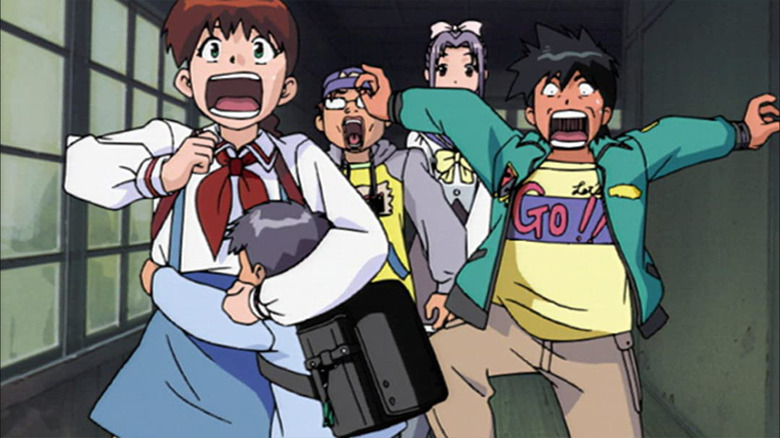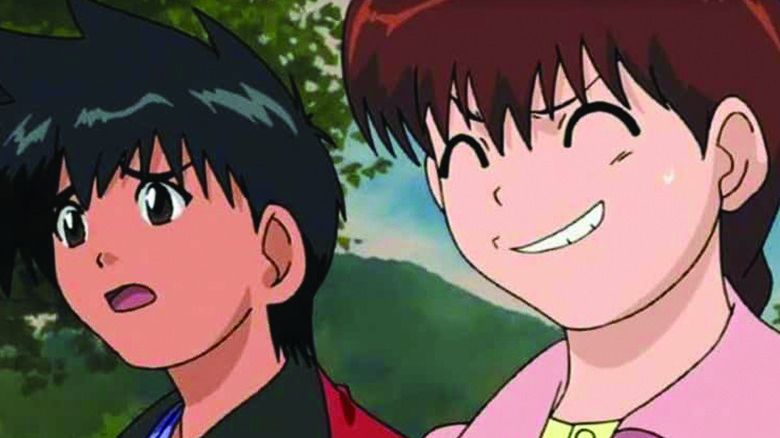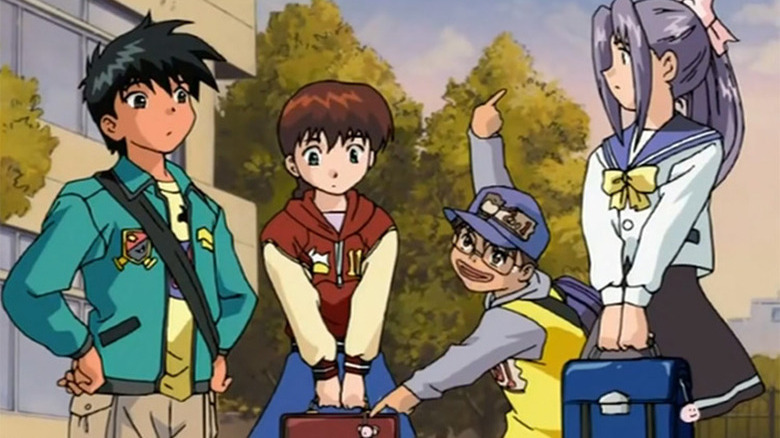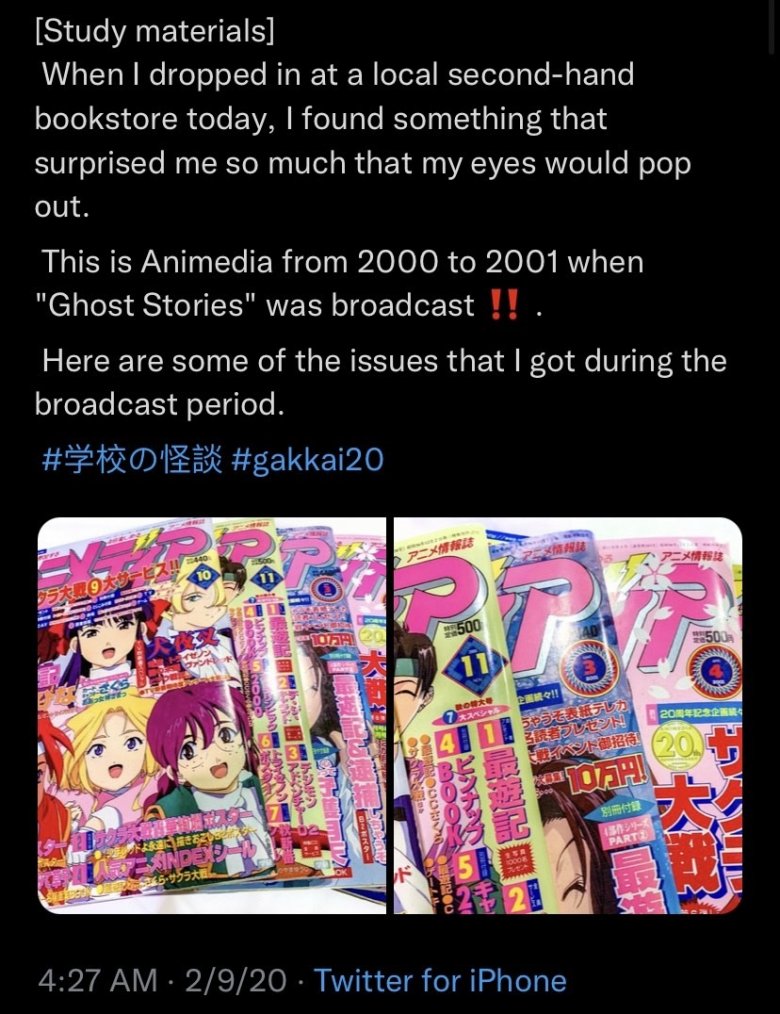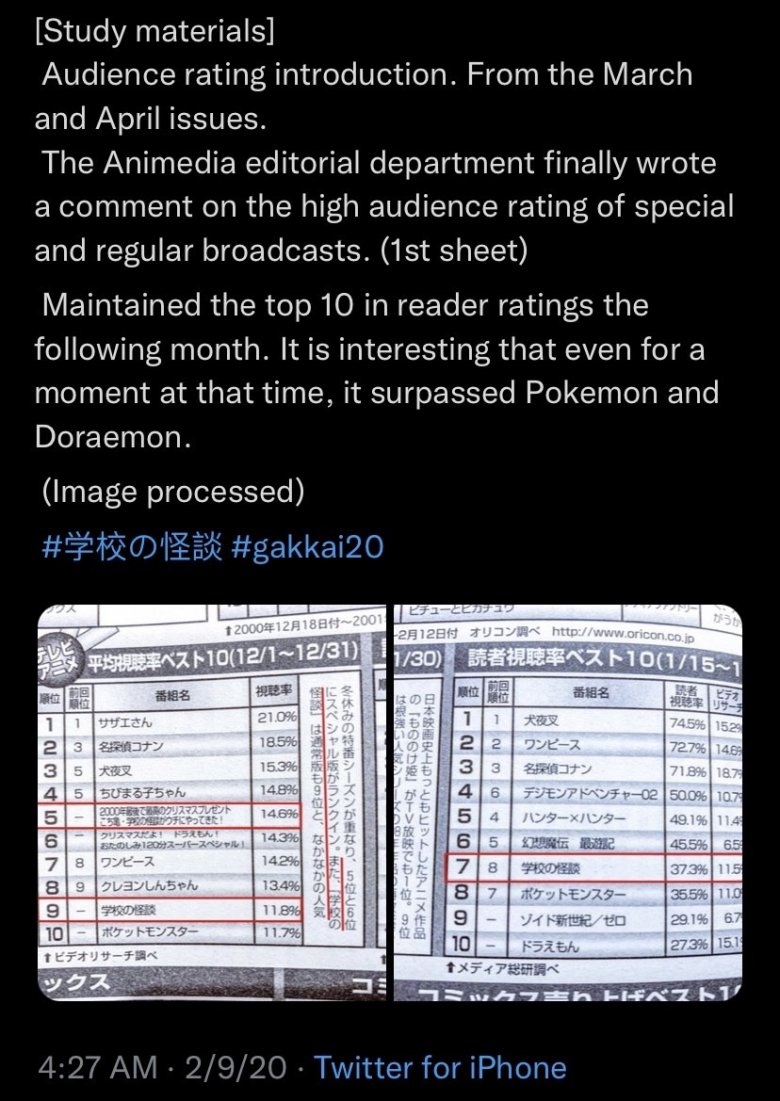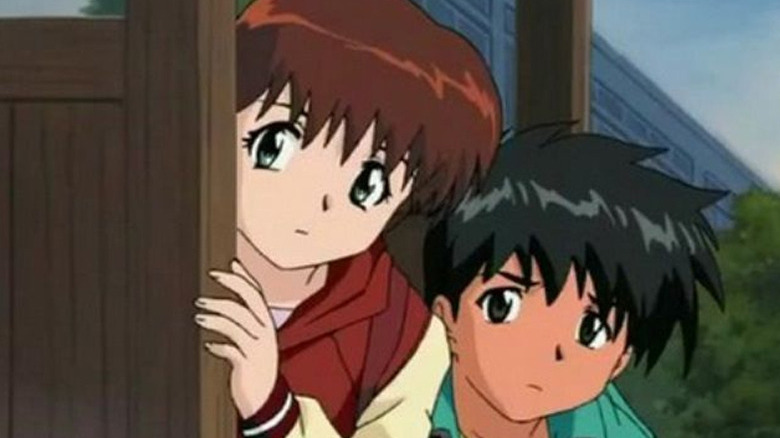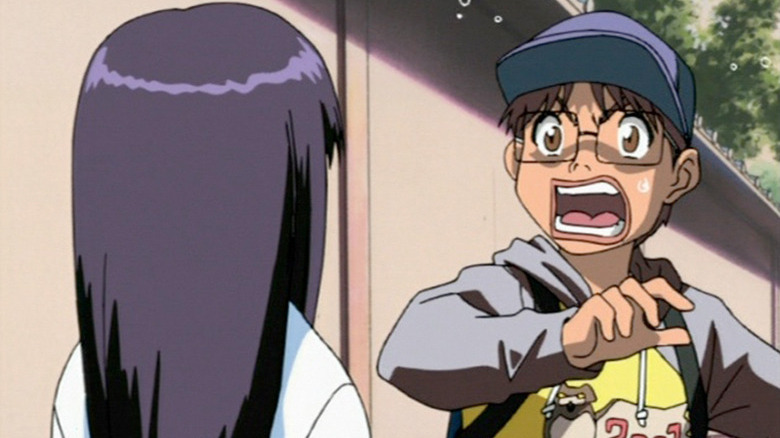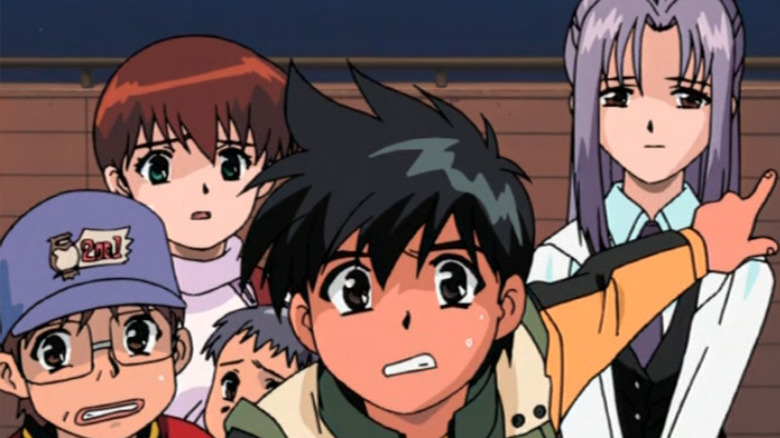Why Everyone Thinks The Cult Classic Anime Ghost Stories Bombed In Japan — When It Didn't
Nearly every seasoned anime fan has heard of "Ghost Stories" and its infamous English dub loaded with a plethora of politically incorrect jokes and absurdist humor. How did such an intentionally insane script for the official English dub come out of what was originally a dramatic horror anime? As the story goes, when the original Japanese version of the anime "Ghost Stories" premiered in 2000, it was a total flop. In fact, it was such a financial and critical failure in the Japanese market that Aniplex, the studio that owned the western distribution rights for the series, was more than willing to let ADV Films — a now-defunct American entertainment distributor — give the series a complete overhaul for the English dub. The result was one of the most wildly offensive, bizarre anime dubs ever made.
While much has been written about how the English dub achieved cult status for its crude humor, fourth wall breaking, and high levels of absurdity, little has been said about why the original allegedly bombed beyond "the script was bad" and "it sucked." Dissatisfied with those answers, I was possessed by the spirit of obsessive curiosity, and what I discovered goes against everything we've been led to believe about "Ghost Stories" for so long.
Ghost Stories Wasn't Actually a Failure
Like. At all. In fact, there's no real evidence to even suggest that "Ghost Stories," with its original Japanese script and audio, was actually the massive failure we've all been led to believe it was; however, there is overwhelming evidence to the contrary.
For starters, "Ghost Stories" was already a popular IP before the anime series premiered in 2000. The anime is based off a bestselling manga of the same name, and the manga was popular enough to spawn a live-action film in 1995. The film also earned its fair share of popularity, and it even received a Japanese Academy Award nomination for best screenplay. After that, there were multiple live-action sequels, animated movies, and a video game based on the "Ghost Stories" manga, all of which came out before it was finally adapted into a 20-episode anime series that ran from October 2000 to March 2001, on Japan's Fuji TV. The series was clearly set up for success, so how did it perform?
It Had Solid Ratings & Aired in Other Countries
Like its predecessors, the "Ghost Stories" anime TV series was well received. The anime maintained a dedicated audience and average viewer ratings of 12-14% during its initial run. For perspective, some episodes even brought in higher viewer ratings than the immensely popular "Pokemon" at the time. Further illustrating this is a series of tweets depicting the ratings for "Ghost Stories" and other anime during its original 2000-2001 run, which were published in a Japanese publication called "Animedia Magazine." The original tweets are Japanese, but I took the liberty of providing the most relevant (and translated) screenshots below.
If you need even more evidence that we've all been tricked into believing a successful show was an epic fail, there is also the fact that the original anime has received overall favorable reviews in Japan, garnering a rating of 3.7/5 stars based on over 230 user reviews on the website Anikore.jp (the Japanese equivalent of My Anime List). While the reviews and site are in Japanese, I was able to translate them through the power of technology. These reviews range from 2014 – 2021, so one could argue that perhaps hindsight softened perception of the show, but this assumption is undermined by the fact that many of the reviewers mention how nostalgic the show was because they watched it throughout childhood, and just as many of them praised the story and horror elements as they relate to Japanese yōkai folklore. If the anime was truly as awful as the rumor alleges, why would people continue to go back and watch the supposed "boring" version, and why would so many people possess fond childhood memories of watching the show when it first aired?
Further contradicting the alleged failure of the anime in its original form and country is the fact the ADV Films English dub is the only version of "Ghost Stories" in which the original script was radically altered. The Japanese version of "Ghost Stories" aired in numerous countries, and the overall tone and script remained unchanged even when it was dubbed in other languages. The series also received another English dub that stayed faithful to the spirit and intent of original script, and that dub was broadcast in various parts of the world as well. The original Japanese version has also been streaming on Crunchyroll since 2015.
There's no reason why a failing show with a poor script would receive international broadcasts with dubs in various languages, nor is a there a reason why any studio would waste time creating a more faithful English dub if there wasn't positive reception of the show with its original tone and script. Given the considerable amount of evidence to the contrary, where exactly did the false narrative that the original "Ghost Stories" anime bombed in Japan come from?
Steven Foster vs. The World
The misinformation comes primarily from a single source: Steven Foster, who served as the ADR director for "Ghost Stories." When it comes to anime dubs, the ADR director's job is to interpret the original Japanese script into another language, such as English. During this process, the ADR director may localize aspects of the show in the new script, meaning certain details are altered to better appeal to specific cultures and regions. An example of this is how Pixar changes things in its films for international audiences. In Foster's case, he enjoyed taking things a step further.
Foster has served as the ADR director for various anime shows, earning a reputation for his habit of making strange changes to the story, tone, and dialogue for the English dubs he oversaw. This habit eventually became so well-known that anime fans began calling these changes "Fosterizations." It's not exactly an affectionate term, but one Foster himself is incredibly proud of, as evidenced by this blurb from the "About" page of his website:
"My liberal take on anime made me famous to millions of people, while making me infamous to a few others, mainly trolls. Now I'm not 100% sure which side is responsible for it, but I...am in the Urban Dictionary! You see, the critics reviewing my shows came up with a word for my "technique" and someone got that word into the Urban Dic. Now 'Fosterize' has a kind of snarky definition and while I believe it should read 'f***ing something up because it wasn't perfectly fine at all, in fact it kinda sucked,' I'm still oddly proud of this weird little accomplishment. And, yes, I did buy a mug with the definition on it."
So there's that. Even before the "Ghost Stories" dub, Stephen was already taking some interesting liberties with the anime shows he was tasked with dubbing, sometimes even going so far as to change things without the consent of the original owners, leading to controversy and fan backlash. Anime YouTuber and self-described "Ghost Stories truther" MercuryFalcon goes over some of these issues and controversies in his own video concerning the strange mythos and legacy of Foster's "Ghost Stories" dub. In it, he mentions two shows that Foster was the ADR director of prior to "Ghost Stories." In both cases, he made major — sometimes completely nonsensical — changes to the tone and script of each show. One of these shows is the English dub of the anime "Sorcerous Stabber Orphen," which drew criticism and negative reactions from fans who were displeased with the severe change in tone and dialogue compared to that of the Japanese version with English subtitles. These sentiments are summed up in a review of the show from Anime News Network:
"Unfortunately, much is left to be desired with the English track. The dialogue virtually had nothing in common with the Japanese dialogue, and even worse, words were spoken in length where there was complete silence on the Japanese track. The actors themselves performed well, but the voices were badly cast, leaving characters with their personalities badly hacked and betrayed. [...] if you do decide to watch Sorcerous Stabber Orphen, I implore you, stay away from the English track if you value your sanity."
Additionally, in Foster's book "The Last Alias" he describes the radical changes he made to another anime, "Super Milk Chan," going so far as to shoot and splice in his own live-action scenes that had nothing to do with the original show. ADV Films also produced another English dub of "Super Milk Chan" which was free of Foster's additional scenes and altered dialogue. Both dubs were presented to Cartoon Network, and the network chose to air the faithful adaptation of the series, rather than the "Fosterized" version. Clearly, Foster was already doing whatever he wanted with the series under his control before he got his hands on "Ghost Stories," which kind of goes against the implication that he was suddenly given unprecedented power by a studio that was desperate to have someone save their failing show.
The Fosterization of Ghost Stories
Steven Foster was working for ADV Films when "Ghost Stories" landed in his lap. According to his version of events, he was told that "Ghost Stories" was such an unsuccessful show in Japan that Aniplex, the studio in charge of the western distribution rights, didn't care what he did with it as long as he followed three rules: Don't change the names of the characters (including ghosts), don't change the way the ghosts are defeated, and don't change the overall story. Otherwise, he was free to do whatever he wanted because they just wanted to recover from the loss of the show doing so poorly in Japan. This version of events doesn't entirely make sense. If the studio didn't really care what Foster did with the English dub, why would they go to the trouble of giving him guidelines that indicate an effort to preserve the integrity of the original?
With these instructions, Foster then took it upon himself to completely alter the script, turning the dramatic children's horror anime into an intentionally offensive, outlandish self-parody. Obviously, Foster's dub of "Ghost Stories" received a lot of attention and has become a notorious cult classic among anime fans, something Foster is extremely proud of since he makes a point to talk about it on his personal website, "I'm probably best known for the cult hit 'Ghost Stories,' a once ho-hum kids' show I transformed into 'the South Park of anime' and 'a comedy for the ages' and, according to 4,343,783 people on YouTube, 'the best dub ever produced'."
While it's great that he was able to achieve success via the "Ghost Stories" dub, what was the point in embellishing the origin story by claiming the show failed in Japan when it clearly didn't? It's strange to think that someone would just make up such a thing, but surely, he had to have some knowledge of the show's success in its original country. If not, why lie about it? While I can't speak for Foster, I do have some theories about how we were all duped into believing Foster "saved" a failing "Ghost Stories" with his script overhaul.
So What Is the Truth?
One theory is that because the original Japanese script of "Ghost Stories" contains multiple references to Japanese folklore, perhaps the distribution company was not confident that American audiences would understand or appreciate the references, resulting in ADV Films being given an unprecedented amount of creative control when it came to "Americanizing" the English dub. This theory doesn't really hold up when we consider the fact that an alternative English dub was made that kept the overall script intact, and that the show aired with original script (and faithful dubs) in other countries.
Another theory is that Foster simply misunderstood what he was told about the anime's success in Japan; however, given the previous instances of him doing whatever he wanted with the anime dubs he produced regardless of their prior success or original tone, this also seems unlikely. It is made more unlikely by his own admission that he enjoys "f***ing up" things that he believes "kinda suck," which leads me to believe that he thinks he was a superior writer who improved upon the foreign works he was given. You know, the ones he seems to think were terrible until they were blessed by his quirky touch.
This brings me to my third theory, and I want to preface this by saying I have nothing against Steven Foster. I have even watched and enjoyed his version of "Ghost Stories" because I can appreciate the absolute absurdity of it all. That said, I do think the most likely scenario concerning the lie that "Ghost Stories" failed in Japan is that Foster is a guy who just wanted an oddly heroic, zany backstory to explain how the dub came to be. Looking at his website, it's clear he's incredibly proud of his legacy as the ADR director who liked to mess with scripts just for the hell of it — and pissing people off as long as it gets him attention. I'm not holding the attention thing against him because don't we all crave to be acknowledged on some level?
On the other hand, there's also something to be said about the very poor optics of crafting and perpetuating a false narrative in which a decently successful Japanese children's anime is maligned as a failed "ho-hum kids' show" that had to be "saved" by an American writer who clearly had no respect or regard for the source material. Whatever the true motivation was for creating and spreading this lie, whether it was born of an innocent misunderstanding or one guy's hubris, a major part of what we've been told about how Steven Foster's "Ghost Stories" English dub came to be is simply untrue.
